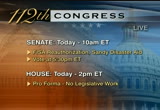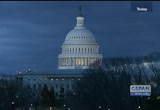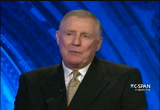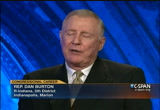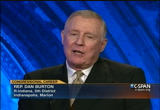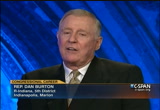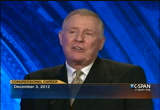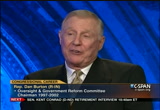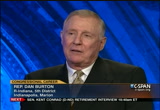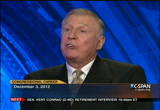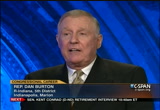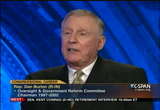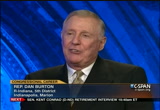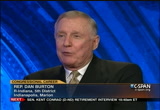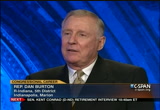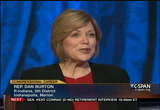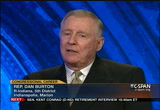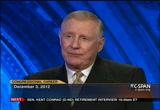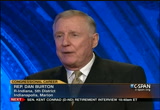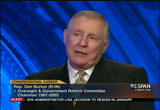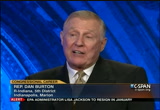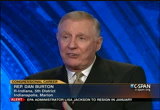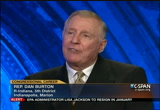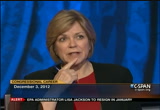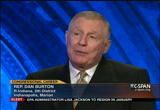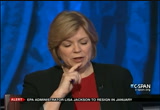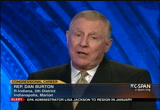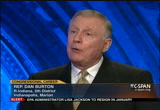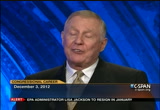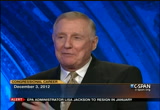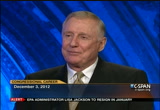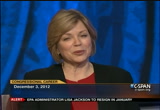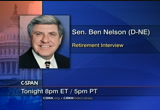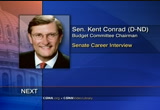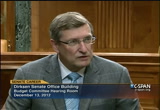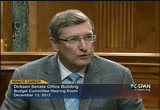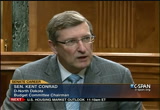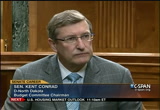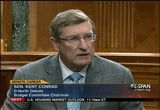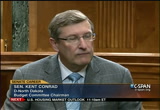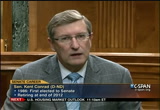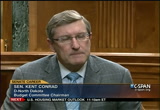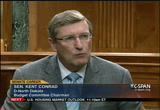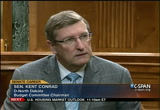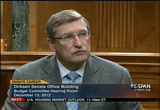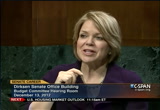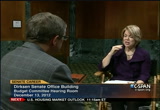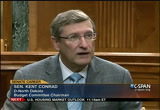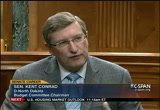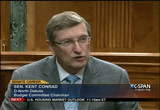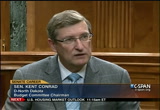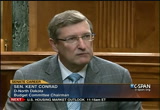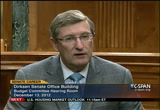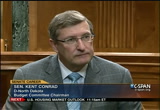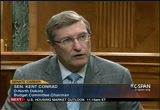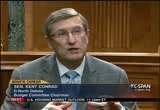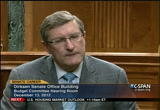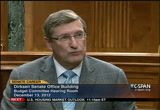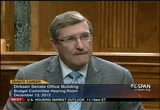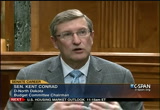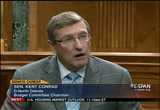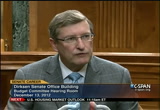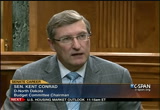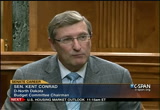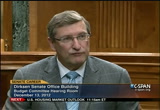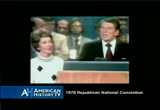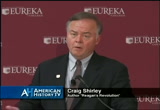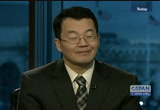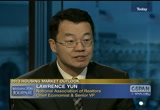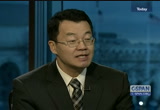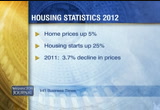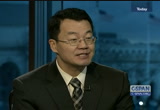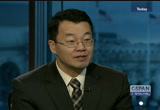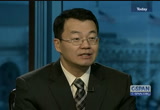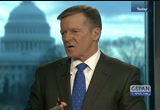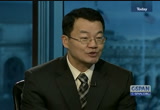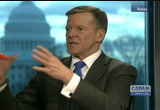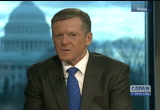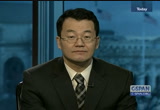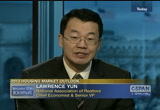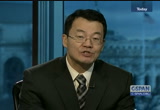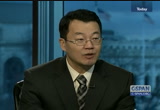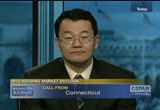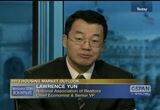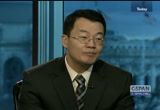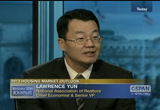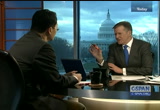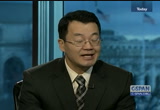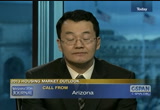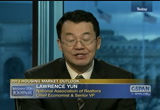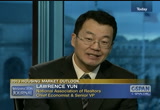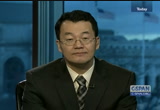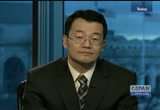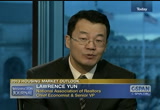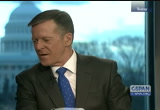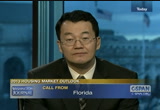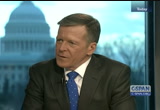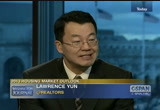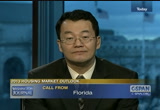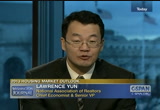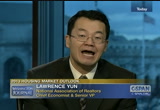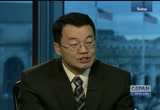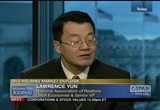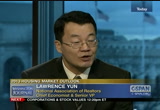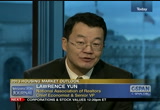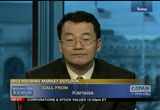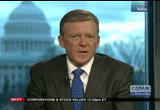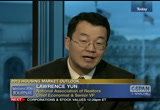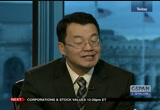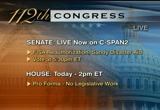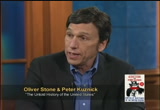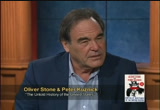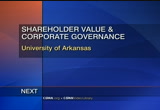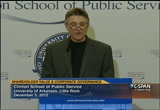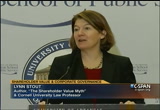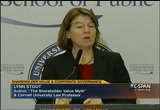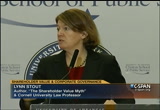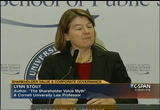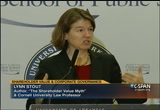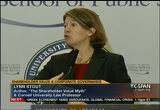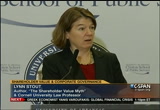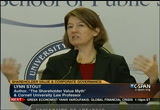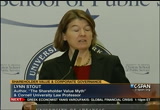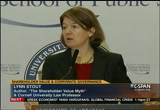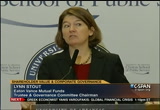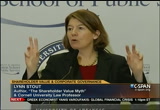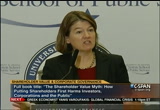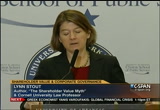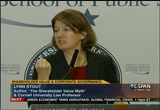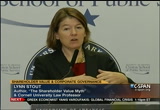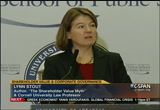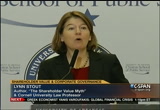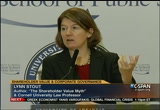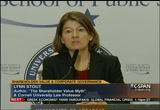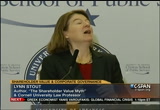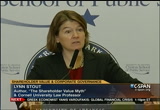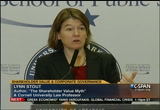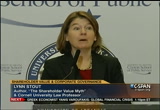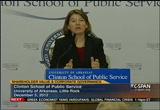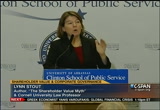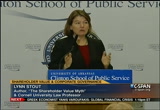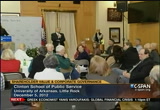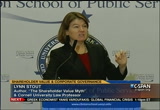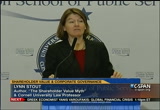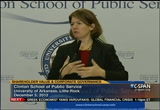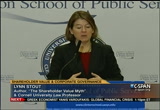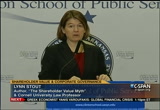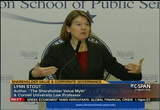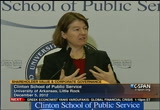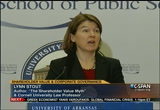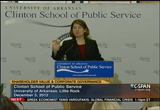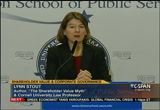tv Public Affairs CSPAN December 27, 2012 10:00am-1:00pm EST
10:00 am
. another, a $60 billion release package for areas affected by hurricane sandy. later today, the senate will swear in brian schatz to replace daniel inouye, who passed away last week. the house returns at 2:00 p.m. eastern. no legislative work is expected. we have an update on fiscal cliff negotiations this morning on "washington journal." guest: this is a recession
10:01 am
between christmas and new year's. i do not know. maybe they should finish their work. you will see some push in the next few days to get a small deal done. viewers are fan of the process. anything that gets done needs to be done quickly before new year's to be signed into law. today is the 27. and so you have a few days left for lawmakers to make a deal. the president's should land at some point. there is a 5 hour time
10:02 am
difference. they have to figure out something. it seems likely will go over the cliff. it has been looking like that before the holiday, but certainly now, particularly if you remember for congress broke for the christmas break, speaker raynor was not able to get the backup plan through his caucus, so there was no pressure on democrats to try to counter that immediately. senate democrats saying we passed a bill that raises tax rates on incomes over $250,000, we ran on this and this is what we are offering. house republicans were saying, no, we want to negotiate something, figure it out and send it to us. someone is going to have to
10:03 am
move. the question is, who? the president met with senate majority leader harry reid before going to hawaii and his offer was to extend the tax cuts for incomes under $250,000, extend unemployment insurance benefits, and the lady across -- and then delay the across the board automatic cuts that are supposed to start january 1. that seems to be a non starter with republicans. it's hard to see where we go from here. host: have they been talking over the christmas break at all? also, one has been the role of -- what has been the role of senator mitch mcconnell? guest: the line that comes from the speakers office all the time is the line of communication remain open. i don't know how much talking
10:04 am
they did as the president was in hawaii spending time with his family and the speaker was back home in ohio, i believe. i don't know that for sure. everyone was doing their family time and not really working that significantly on something. i think there was probably some minimal conversation, but not a lot. as for the senate minority leader mitch mcconnell, i think that is a good one. a lot has been made in the past few days about him taking a higher profile role in these negotiations. while i don't like prognosticating into the future, we can look at the past in some of the previous negotiations of congress and the kind of role he has played. almost all of these talks, whether it was about government shutdown in the spring of 2011 or the debt limit debate in the summer of 2011 or the payroll
10:05 am
tax-cut debate last year, those negotiations started at a level between the president and speaker but always broke down at that level and that pushed to the senate where harry reid and mitch mcconnell had to figure something out and get enough votes for it so they could give some cover to the house republicans, who were joined by a large majority of house democrats to get something done. the idea that we have come to this state is not necessarily surprising. that it has taken us so long to get there has probably frustrated everyone who wanted to take a holiday break. if mitch mcconnell wants to play ball, and i think there's a role for him to do so. when you speak with aids from -- from his office, they say we will get involved, but we would like to see some good faith offer from the majority leader. -- with aides from his office. right now that process has not happened.
10:06 am
as for for action today in the senate, it's not going to be anything where they reached the fiscal cliff. but there's not enough agreement to have the rank and file members do anything. it is still at the top level leadership discussions. the senate is going to try to finish work on a sandy disaster aid supplemental bill which they have been trying to get done for weeks. they are hoping to finish that today and also trying to work on a foreign intelligence surveillance act authorization extension. there's enough on the floor to keep them busy. the question is whether they will have something to vote on may be on christmas eve. on sunday joe lieberman indicated we would all be working new year's eve. we will see that happens. >> online, we have a special
10:07 am
page set up related to the so- called fiscal cliff. you could watch video of hearings and briefings. there is a live stream of comments from viewers and reporters. that is all at c-span.org cli cliff.l >> it is a great resource for anyone to know the ins and outs of capitol hill. >> julie watches c-span on verizon. brought to you as a public service by your television provider.
10:08 am
>> dan burton is retiring from congress. he talked with c-span about his past investigations of the clinton investigation and the oversight role of congress. this is 30 minutes. >> how would you say the state is? >> it has changed a great deal. it is not the same as when i came 1983. there seemed to be more comedy. tip o'neill was speaker. i will never forget he was the
10:09 am
first time he was on the floor raising cane with democrats. and he came down and started giving me the dickens. after that we became very good friends and played golf together. bob michael was a wonderful leader. there was a spirit of camaraderie even though we had differences politically then that we do not have now. now it is much more combative. i have a lot of friends on the democratic side of the aisle, very good friends. as far as working things out is not as easy as it used to be. >> what are some of the root causes? >> i think and i am not pointing fingers, when we went after jim wright, newt was the speaker and jim was forced out of office. they went after newt. the combat became very personal.
10:10 am
that is one of the things that started this movement. over time, i think it has become political as well as personal. much more political and personal. >> she said raising cain, are -- -- you said raising cain. you will the gavel for the oversight committee and use that to raise the number of investigations especially of the clinton administration. what do you see as your legacy of that tenure? >> i think bill clinton, president clinton and hilary as secretary of state do not like me very much. i was chair of the government oversight committee during the time we were investigating whitewater and we were investigating campaign contributions that came from sources outside the united
10:11 am
states and from various people. there was an awful lot to that. we had people testifying like johnny chung, they had contributed money to gain favor with the white house. there were other illegal contributions that we found. and they came into the kitchen at hong kong and said we wonder -- we like your president and we want to contribute to his campaign. the man who said that was the equivalent of the cia. these were people who were under oath and swore to this and we also had over 100 people take the fifth amendment or flee the country. there was a lot there. that is not to say that president clinton did not do
10:12 am
some good things. he worked with newt gingrich and we got out from under some difficult financial problems but i do believe and i still believe there was some illegal activities that took place and we were unable to get the job done. i've always said that janet reno was the greatest blocker than anybody i had ever seen in the national football league. one thing i've learned was if you're the president and you want to protect your legacy and office you want to make sure you have an attorney general that will protect your back and janet reno, god bless her, she did that very effectively. i sent five criminals i thought were ironclad and she never moved on any of them. so i think the clinton administration did a lot of good things. i also think there were things that were done wrong. that should have been pursued and that is why we pursued them
10:13 am
so diligently. i was criticized roundly, they made fun of a lot of things we did. that goes with the territory. >> when you want to explain to people about the investigation's power of congress, how do you explain that role of congress? >> the congress has the responsibility to ferret waste, fraud, and abuse. we're supposed to oversee that. most committees do not do a good job of it. when i became chairman, newt charge me with being aggressive in a number of investigations. i investigated the food and drug in restoration and the fbi and the white house and we found there were people in jail for crimes they did not commit. j. edgar hoover knew about it. there were a lot of things that
10:14 am
were wrong in government that were not readily known. we had our investigations and we were very aggressive. what did we do? i issued over 1200 subpoenas. i do not think anyone will ever touch that record. i am not sure it is a good record but it was when i thought -- it was one i thought was necessary. we wanted to get to the bottom of a lot of these things and i think it paid off. we not only put pressure on the clinton demonstration, i put pressure on the chief counsel at the white house. i know you probably heard of whitey bolger who was captured recently. his brother was one of the people we have before committee working on that. there were a lot of things we did. that is the responsibility of congress. the oversight of the executive
10:15 am
branch and the agency's ies of government is extremely important. no matter what you believed, what you think, there is waste or fraud and criminal activity and abuse in any government. and you have to take a hard look at it. >> with that hyper-partisanship you were talking about and it's true causes, did your aggressive stance for investigation contribute to that and if so, is that the price you think is necessary to pay? >> i think that it did contribute that. you are stepping on toes. when you go after the president of the united states, he had -- you had better have armor plate. they will put a stop to your investigation. which they did. they contacted girls i dated in school, they went into everything. that is one of the things you
10:16 am
have to expect when you are aggressive and it does cause problems. but nevertheless, i have no regrets about it. if you're going to do your job and do it to the best of your ability and live up to your commitments to the constitution, you have to be ready to take the slings and arrows of outrageous fortune. >> what did you learn through the experience of the powers of the executive and the powers of congress? >> as i said before, i learned the president of the united states, if he has an attorney general that will stand behind him, there is very little that can be accomplished as far as bringing illegal activity to the fore and to justice. richard nixon, he went to his attorney general and did not get support. that was during watergate. i do not think he would have left office. i felt we had strong evidence
10:17 am
of illegal activities. janet reno protected him and i think that ended up helping him a lot. but i want to point out if bill or hillary is the attention, -- is paying any attention, they did some good things and i think the economy of the country was helped because he worked with newt gingrich so there were some positives but nevertheless, i feel like there were some things wrong that we were pursuing. >> we're talking about presidents. you served under five of them. i wonder if you could reflect on which of those presidents and administrations to the best job of relationship-building with congress. >> no question, the greatest man i ever met and the greatest president was ronald reagan. ronald reagan had a heart and determination and i have -- that i have not seen anybody in the white house or anyone in congress since. he was a soft-spoken fellow who
10:18 am
was so underrated, it was not funny. let me tell you a story about his heart. my father tried to kill my mother when i was a boy. that is one of the reasons i never liked bullies and why was aggressive on a lot things i did. i think my father had a lot to do with it. he went to prison and my mother waited on tables for 18 years and he went -- she married a man who went to the grade. -- he went to the seven grade and worked in a foundry. i said i will take you in the front door of the white house and introduce you to the president. they looked at each other and said yes. they never met anybody in politics. 18 years later i got elected to congress and i called reagan's secretary and let me see if i can arrange this. they arranged it and mom and kenny came. we parked behind the white
10:19 am
house. we went into the oval office and president reagan came over and said, i want to tell you your son is one of the brightest young congressman we have and he is going to do great things. i know you have to wait on tables for 18 years and it worked in a foundry. and danny had to shine shoes. i know it was tough. we had those problems in my family. isn't it great we live in a country where you can achieve anything? all i could think was, how did he know this stuff? he had had his secretary call to find out about me and my family. when i walked out of that office, i would have done anything for that man. he made my mother feel so happy. she was so happy and she carried the picture until she died. her favorite actor was ronald reagan. >> a lesson for that about
10:20 am
relationships for president is the personal touch? >> it is a big part of it but it was not just a personal touch. he had goals like the strategic defense initiative. i was the first one who defended him against a guy named al gore and tom downey. they were on the floor and calling it star wars. i went after them for about an hour. reagan wrote me a nice personal letter the next day. he was very committed to what he wanted -- mr. gorbachev, tear down this wall. once he made up his mind he was very strong in his position but he was also very amenable to dealing with people where he could. he was not so hard knows that he -- hard-nosed that he was not willing to try to find a way to solve problems. he worked with tip o'neill, a very strong democrat, in order to solve the social security problem and i am not sure any other president would be able to achieve what he did. plus the economic growth with
10:21 am
his tax cuts. we had 20 years of growth because of him. i think he had that real nice, soft personality, a very warm guy who knew what it was to be poor and to fight your way out of difficult things. but he was also a man who had convictions. he was willing to go to the mat if he had to. a good man. the best i knew. >> does the presidential nominating process bring candidate in to this system with conviction, with the kind of skills you think it takes to be a successful president? >> i do not mean to disparage anybody who has run for office but i think there is too many people running for office who are concerned about politics in getting elected than doing what is really right. i feel like ronald reagan was one of those guys who had a commitment in his soul to do what he thought was best for the country, and not to worry about being partisan all the time and being worried about the next election.
10:22 am
and so i think right now we have too many people that when they run for office they read the polls and they try to do what they think is going to get them elected instead of saying what they believe and i think it is time now that we need people who will speak out forcefully about what they believe, because the people of america are hungry for that. they want someone who will say clearly, this is what i believe even if they disagree but i will do my best to achieve these things and stick to it. i have people in my campaigns say i do not agree with you on this but i think you're a straight shooter and i will vote for you anyhow. i'm not holding myself up as any paragons of virtue but i sense from that that people are willing to give you a chance if they think you are a straight shooter. >> you made reference to using for time as a way to achieve -- using floor time as a way to achieve policy discussions. when you looked back, you have
10:23 am
spent a lot of time on the floor. some members never go to the floor. how have you seen the floor as a research as a member of congress? >> they used to be that you could go down and get an hour's special order. you could do it all night long. a guy from texas would talk about the space program and talk about chuck holes in his district. he covered the spectrum. they started changing it that we had quit by midnight. which was all right. i think we have gone too far. members need to speak their mind on personal time more than just five minutes in the morning and maybe one minute at night. many times, there are things that need to be eliminated with -- illuminated with a little extra time and getting two minutes during a debate or one minute at the end of the day or five minutes in the morning, sometimes as i get it done. at ould like to see th
10:24 am
revisited. >> many members complained or hearken back to the time when members used to stay around on the weekends and go out to dinner with one another and families would get together. what changed that? >> i think the acrimony that started with the jim wright case and going after newt, that was a payback. i think those were the seeds for a lot of that. we're not friends any more. i still get together with some people for dinner. very rarely is it with my democratic colleagues. i ere are some democrats ar really like, charlie rangel. there is a lot of guys that i like on the other side of the aisle and we get together once in awhile but it is not like it used to be. it should be better. >> any sense of congressional scheduling practices change that? people anxious to get home on weekends?
10:25 am
>> when i first ran, i spent $250,000 or thereabouts for my first campaign. now what cost up to $2 million. members spend an inordinate amount of time at their headquarters calling people, begging for money. i think you spend maybe one- third to one-half of your time asking people for money. that should not be the main objective of our job. we should be doing the job for the people instead of worrying about raising money. i do not know what the answer is. maybe limiting the terms of the campaign, i do not know what it is. you cannot limit the funding because of the first amendment. it is gone way beyond the pale. i think -- we have state representatives that are spending three-quarters of a million dollars for house seat
10:26 am
in indiana. we have gone beyond where we should. >> in addition to your long service, you have been on foreign affairs. >> 30 years. >> a somewhat early association was with jesse helms. how did that alliance come together? let's start with that part of the story. >> i was always a strong anti- communists. i never liked fidel castro. i became chairman of the subcommittee on western hemisphere. i worked with some of my cuban- american friends, ileana ros- lehtinen and bob menendez and we worked hard to put sanctions on castro to try to bring that regime down. we were not able to get it done --it was not until the soviet mig that was shot down, they shot a couple of them down.
10:27 am
one of them made it back. that created a huge furor. bill clinton was not going to sign the bill. bill clinton was put in a difficult position. so we got it passed. i was the author in the house and the jesse helms was the author in the senate and we worked together on the bill along with my cuban-american brands. >> that regime is still around. at the time, a number of our allies protested the bill. in the rearview mirror, how effective was it overall? do you feel good about that? >> it shows the repression is so strong in cuba, the ability of fidel castro to reach out to some of his "friends" around the world that he has been able to circumvent sanctions. i think we ought to do everything we can to bring
10:28 am
freedom to the people of cuba. the helms-burton law was not as effective as i would have liked. >> another issue out you are associated with is autism. how did that get started? >> my grandson was a very normal child. when he was 18 months to two years old, he got nine shots in one day. seven of which had thimerosol, mercury. it is a preservative. never been tested. in 1929 it was tested on the 29 people who had meningitis. all of whom died from the meningitis. they said that the mercury had no impact so they started using it in ophthalmologic solutions. when children get a few vaccinations, it did not have a huge impact but they started to get as many as 25 or 30 before they get to the first grade. my grandson got nine in one day and he became artistic, banging
10:29 am
-- autistic, banging his head against the wall. then diarrhea and constipation. he could not look at you. he was doing terrible. i was not aware of autism and all but i was chairman of the committee that did the investigation so i started to looking into with health and human services and the food and drug administration and that is where i had four years of hearings on that and i became convinced that women -- that mercury, women who are pregnant should not eat any fish. we are injecting it into our children and adults in the form of vaccinations and the brain tissue according to the scientists we have before the committee is very soft and it is hard to get that mercury and of -- out of there once it gets into the brain. and we saw very clearly how it
10:30 am
affects the brain cells. i would be working on this after i get out of congress to get mercury out of everything that goes into the human body. a causes autism and other neurological problems and is a contributing factor to alzheimer's. when you get a flu shot, and has mercury in it. and so i have to tell you right now. my colleagues do not know it. in 10,000 have one eye an children who were autistic. we're looking at one in 10,000 children who are autistic. we have an epidemic and we have to find other reasons. i think the mercury in vaccinations is a contributing factor. >> after the investigation, did anything else come out of that effort? has anything changed? >> we were able to change the
10:31 am
vaccinations. i think that was a giant achievement. they have also tried to sneak legislation to that will protect the pharmaceutical companies against class-action lawsuits and we have been a will to stop -- able to stop that. it is a never-ending case of constant vigilance to make sure they do not protect themselves. i met with the leaders of the various pharmaceutical companies, ceo's, a whole bunch of them. i said if you would put money into the vaccine injury compensation fund to compensate people who were damaged and if you get mercury out of the vaccinations and put the shots into single-shot vials which cannot require a preservative, i will get legislation passed that will protect you against class-action lawsuits. it would not do anything with it. i will continue to fight and
10:32 am
one day, 10 or 15 years from now, somebody will say to you remember dan burton? we finally got mercury out of those things. mercury is toxic to the human neurological system. we need to get every form of mercury out and in particular, stop the vaccinations. >> we have mercury in the light bulbs. >> if you drop one and break it, there're all kinds of things you have to do to protect yourself from being exposed to the mercury. we have l.e.d. bulbs and they work fine. where we using this things? >> back to autism. you have the great support of the autism community. another aspect of it is the size of the debt.
10:33 am
you have brought lots of federal dollars to autism. including money going back into your district or there is a -- where there is a center at the university. >> they wanted me to name it after my grandson. >> were that way, your personal -- square that away with your onal interests as a member of congress and an important issue with where we are today on the size of the federal debt. how should people think about those things? >> we should prioritize our spending. we spend an inordinate amount of money on the aids epidemic which i have no problem with. we need to find out how to stop it. we're spending a huge amount of money on that and not a great deal comparatively on autism. or other neurological diseases. we have -- we are spending more than when i first started this crusade but we certainly need to spend more. when you see the huge increase in the number of people dying
10:34 am
from alzheimer's and you realize they're putting mercury into human beings and that is a contributing factor into these problems, we need to spend more money finding out how to stop that. we're not spending nearly enough. we spent $40 million year, maybe 50 or 60. nih gets billions of dollars. this is an epidemic that must be dealt with. if you have an autistic child, that child will probably live to be 70. you may not be able to take care that charles past 18 or 20. -- of that child past 18 or 20. we have people who are afraid to be in the room with their child because they are afraid. people are losing their homes, they are mortgaging their homes to help their kids and it does not work. this is to be a huge burden on their families and the taxpayers over the next year. -- next 50 years. we need to get to the bottom of
10:35 am
it as quickly as possible. all these things are important. my first wife died of cancer. aids is important. autism is an epidemic. it will stick with us for the next 50 years. we have to deal with it. >> we have four minutes left. with regard to the state of the u.s. economy, you have some important votes cast before the lame-duck session is over. what is your level of confidence about the future of the u.s. economy right now? >> i am not really optimistic. i think that we have a short- term solution. the president wants to spend more money. i understand that. he also wants to raise taxes on people over $250,000 and he will get part of that. he will have a bill that says we have to give everyone a tax cut, who will vote against that? he has the ability to wait. that is number one. we are trillions of dollars in
10:36 am
the hole. not just $16 trillion but $60 trillion or $70 trillion. this will come back to haunt us. we will have a severe economic problem. i hope i am wrong. i hope there is a solution. unless something radical changes, we will see a severe economic problems and high inflation. >> you made the decision not to run again. what will you miss most about congress? >> i will miss the camaraderie. i was one of the founders of the republican study committee which started with four of us. now there is over 170 members. i was talking to them the other night, they were honoring me as one of the founders and i said when i was 19 and in the army, i was lying on my bunk and looking around the room at the guys that had -- i had gone through hell with in basic training. i was thinking i will never see these guys again. i will miss everybody. i will miss a lot of them, all
10:37 am
of them. >> what will you not mess? -- miss? >> i will not miss the feeling as -- that you are not accomplishing as much as you should. i wish my colleagues, i wish you the best. keep fighting. i will be rooting for all of you. >> what would you like your legacy to be of this 30 years? what would you like to be remembered for? >> i would like people to think he might have been a bulldog but he was a man who believed in honesty and integrity and the things that were right for this country and regardless of how difficult it was, he kept to those principles. i hope they will get me like that. -- i hope they will look at me like that. a lot of people think i am a bad guy and did a lot of goofy things but i hope they will think i am a man of integrity. >> what you plan to do next? >> i am not planning on lobbying. i would like to represent some international companies.
10:38 am
i have been chairman or ranking republican on all the subcommittees' and i can help some international companies and some countries. >> do you plan to stay in washington? >> it depends on what kind of business i can acquire. i have a beautiful wife and i want to spend more time with her and get my golf handicap down to single digits. >> have you thought about the preservation of your papers? what will you do with all that? >> i am sending most of it to indiana university. especially the autism information. i think that is extremely important. i have -- the indiana historical society will get some of my papers. i hope they find a good use for them. >> when you look back over 3o long years which went by very quickly, what were the best years? >> oh, gosh, there was good in all of them.
10:39 am
the best years from my standpoint was when i was chairman. even the people who work for me said, we felt like we were accomplishing something. we felt like we were fighting the good fight. that is one of the things i hold most dear. we were able to put on the gloves, grabbed the sword, and fight for the things we thought was right. >> thank you for spending time with this reflecting back on your years in washington. >> and used to look young -- and you still look young. >> thank you. >> one of several such conversations we're having with retiring members. jonas freight sit down with ben nelson -- join us for a sit down with ben nelson. he helped forge a domination.
10:40 am
that is 8:00 p.m. eastern here on c-span. interviews with two retired house members. first jerry lewis and later, a conversation with california lynn woolsey. the epa administrator has announced her decision to resign her posts in january. the chief environmental watchdog is stepping down after a nearly four this year tenure , new controls on coal-fired plants. jackson found herself caught
10:41 am
between administration pledges to solve controversial problems and steady resistant from groups that complaint the rules destroy jobs and make it harder for american companies to compete internationally. that is from the ap. steny hoyer will talk about the looming fiscal cliff during a briefing later today. that will be about 2:15 eastern and we'll have that life for you here on c-span. kent conrad is retiring after 26 years in office. he talked about partisanship in the senate and his time working on economic issues including his time on the bowles-simpson commission. this is 30 minutes.
10:42 am
>> we're talking in a week full of farewell speeches. what is that like? >> it has been great. i have that going away party the night before. a lot of my colleagues were there. then the farewell speech in which i had a chance to reflect on my service here but also to challenge my colleagues to finish the job on the grand bargain to get our fiscal house in order and i laid out the specifics on what would be a genuine compromise between the two sides. it was satisfying. >> why did you decide not to run again? >> many reasons. i have served here 26 years. less than 5% of senators have served that long. part of it is i am tired of living out of a suitcase.
10:43 am
i missed 80% of our anniversaries and 85% of my wife's birthdays. and i thought, it is time for somebody else to take this on. sometimes change is a good thing. after 26 years i felt the need to have somebody else take these responsibilities on. >> some people have written the senate was not the same for you after howard barden decided not -- byron dorgan decided not to seek re-election. >> that is true. he is my best friend. we have been together in political offices, government responsibility for a long time. and more than three years. -- 30 years. when he decided not to run again and my other colleague was defeated, it was less rewarding for me personally to be here. less enjoyable for me to be
10:44 am
here. .'m sure that played a role >> in your speech in your description of the senate, do think the public shows your view -- shares that view of that institution? >> pro will not. -- probably not. it is the world's greatest deliberative body. we are efficient at it producing results. what i also said yesterday was there are problems here and the problems i believe are clear is that we spend too much time trying to seek political vantage. -- advantage. partisan political advantage. too little time focused on solving the country's problems. i am sure that had a role in my decision as well. i came here wanting to do big things and went to work on -- and wanting to work on solving problems. there has been much less
10:45 am
emphasis on that lately. much more of an emphasis on how you get over on the other guy. i understand this is a team sport and i understand this is competitive but at the end of the day, if we're not solving problems, it is pretty empty. >> during your 26 years, can you trace the judiciary of the -- the trajectory of the partisanship and explain what its roots have been? >> i can see it very directly going back to 1994. newt gingrich had a view to take over the house of representatives when he wanted to bring down the institution and things have never been the same since. that is not to say that there were not very deep faults on the democratic side because their work. -- because there were.
10:46 am
there was an arrogance of power that had developed. in part the republicans reacted to that. it has set off a chain of events and a dynamic that is very unhealthy. i hope very soon that we get back to working together, understanding there is a competition. and solving problems. that is with the country needs. >> how much a role as the money -- has the money and politics played in partisanship? >> huge, especially the citizens united case which allows unlimited corporate and wealthy individual contributions. you do not have to identify the source in many cases. that is a cancer on our democracy because what that means as individual members have to spend even more time fund-raising, even more time being entirely political in order to survive.
10:47 am
that is extremely -- an extremely in healthy -- unheal thy development. >> what about the public themselves? the country has become over the last quarter century less aligned with parties and also that pushes the party's more to the extreme. many boats are 50-50. -- many votes 50-50. how has public sentiment changed this institution? >> this institution and the house of representatives is a bright reflection of the -- brought reflection of the american people. because they choose who represents them here. and they are deeply divided. beyond that, you have the effect of media. 24-hour news which they have got all that time to fill and so frankly they look for the loudest voices to put on the air. people who say the most outrageous things are the one
10:48 am
who get their time. that has played a very central role in how this has all evolved. we have to make some traces as a -- choices as a country. are we going to reward the extremes? or are we going to look to the sensible center as the place where decisions need to be made? >> how do you see -- in some cases it is as it is. the supreme court has ruled on campaign finance and social media is here to stay. what do you see as a possibility for healing of the institution? how can that happen? >> mine unbelief is actions are -- my own belief is actions are needed. decisions need to be made. that requires leadership. that requires people to step forward and say, follow me. i am going to take us in a different direction and we're right to face up to these things. then it is each individual.
10:49 am
the choice -- it is each individual's choice. >> you have written books about the great leaders suggesting they are few and far between. do you agree with that? >> i think there are many exceptional people here. i said yesterday in my farewell speech i have enormous respect for this institution. the vast majority of my colleagues want to do the right thing. many times doing the right thing, it is hard to know which is the right path to take in the midst of all this quality. -- of all this conflict. >> that is different from leadership. >> we need very much is leadership at every level. that means from individual
10:50 am
members as well. they have got to decide, are they going to be part of the herd or will they stand up and say what they truly believe? are they going to be part of solving problems? at the end of the day, that is what it needs to be about. >> where does the optimism come from? is that a quality of yours? do you see some signs hear? >> i see signs in the membership. talking to my colleagues, they want a different direction. they want to be part of something that is producing results for the american people. i find republicans and democrats really are like-minded in the sense they want to produce results. >> we're talking in a room you spend a lot of time in. you came to the senate from the
10:51 am
state and your public career has been around finances at the state and federal level. what do you see the legacy? >> the thing i'm proudest of is what we were able to do in the clinton years when we were able to actually balance the budget. created the longest period of uninterrupted growth, created 23 million jobs and paid down the debt. that is a remarkable legacy. we camers ago, w forward with our proposal that became the bowles-simpson commission. we had 11 of the members agree on a plan.
10:52 am
you can i get more bipartisan than that. i still believe that is the best blueprint for going forward. i was also part of the group of six that became the group of eight. it laid out a framework last year. many of those ideas were captured in the proposal i made yesterday, a detailed proposal for how you could compromise these difficult issues in a fair way and get a result. >> let me start with the 1990's. how much of that success was the bursting economy and the paetec -- that was the tech bubble that was happening that brought more money into the coffers? >> all of these things are connected. that is my belief. what happens in the private- sector? we were showing that we could
10:53 am
get results. that gave additional confidence to the private sector. there was additional certainty because people knew what the rules of the road were going to be for an extended period of time. that helped unleash corporate investment. i believe the same thing could happen today. that $1.70 trillion sitting on the balance sheets of american companies. i have had corporate leaders tommy parker the reason they're not unleashing that money -- tell me the reason they're not unlacing that money is they know what decisions we are making here. >> there are gangs of this and groups of that that happve been formed in the past five or six years. how much of that is an indicator of the institution not functioning? >> when you have had major
10:54 am
problems, these groups tend to form and there's a long history of that here. going back to andrews air force base and the budget that was entered their. -- there with president bush 41. you see when a complex financial -- when there are complex financial matters, these groups form. people have to get their homework done and get an understanding of how these complex questions can be resolved. i do not think that is so much a reflection of this -- of this --of dis function as it is a historic precedent of how things get done. >> when you look back historically at these bipartisan commissions or other groups, you mentioned the energy air force base. during the reagan administration, a great big commission that found a solution for social security, these were big public fora
10:55 am
where discussions were held with the public and now everything seems to be happening behind closed doors. why could openness happened in years past and today we can not seem to get to deal? >> in large measure because the media has so changed. in those days, you did not have 24-hour coverage. what you find with 24-hour coverage if an idea services, at -- surfaces, at 10:00 a.m., it is dead by 2:00 p.m. because everybody goes to the cameras. the cameras are there. ever-present and wanting to hype something. before you debate it is dead.
10:56 am
you really see that around here. >> there has been a fair bit of criticism of the president for not embracing the findings of that commission. what is your take? >> i advised the president not to embrace the specifics because i feared if he did, house republicans would automatically be in opposition. if you are part of the bowles- simpson commission you saw that dynamic. there were 18 of us. six representing the president, six representing the senate, six representing the house. five of the six representatives of the present voted for the -- of the president voted for the recommendations. five of the six representatives voted for the recommendations. five of the six representing the house voted against them. both d's and r's. it kind of tells the story.
10:57 am
>> what does it tell? >> the house is voted on -- ever two years is far more reluctant to make them popular kinds of decisions than the white house or the u.s. senate. >> does that suggest there should be a constitutional change? does the institutions to work = still work for society the way the founders intended? >> i believe it would be good to extend terms to four years. that would give them a greater ability to do things that are not immediately popular and we are borrowing 31 cents of every dollar we spend. to get this back on track, require some decisions that are not popular by definition. if you are cutting programs and raising revenue, you are upsetting people. you are doing things that are not popular. it is tough in political life to go back to your constituency and say, what i will be doing now is i'm going to cut some
10:58 am
spending on a program that is popular with you and at the same time, i am going to be raising revenue, which means raising somebody's taxes that help close this gap. at one. -- at one. -- at one point we were burrowing 40 cents of every dollar we spent. we have made some improvement down to 31 cents being borrowed of every dollar we spend. we have a long way to go and we know that the trend line is not our friend. because of the demographics, the baby boom generation, the revenue base is inadequate to meeting what has been the social contract to have social security, to have health care provided to at least our seniors, now more broadly to a guarantee that everyone would have health care coverage. so this is a challenging time for those who seek to represent
10:59 am
their states and their districts. >> listening to one of the many press conferences happening in this town during this deadline, a reporter described where we are right now as a situation of washington's own making. the circumstances, structure, and deadline were part of that earlier negotiations. how did we get where we are today? >> on the revenue side to go back to the bush years when they passed the bush tax cuts for various procedural reasons. it wanted to shoehorn as much tax cutting as they could into a 10-year period and because of the rules, they went overboard, did much more in a way of tax cutting then we can afford. it was apparent at the time they did it. to make it work they sunsetted it all.
11:00 am
after 10 years. that is why the bush tax cuts are about to expire. the same is true of the so- called the sequester. it is an across-the-board cut of $1.20 trillion focused on domestic spending, it was put in place to provide leverage to the special committee that was supposed to resolve these matters and it was supposed to be the sword of damocles that if they did not reach an agreement to sequester would drop and there would be an across-the-board cut. no distinctions, no prioritization. just cut across the board. and guess what? the special committee could not reach an agreement on an overall fiscal plan. so this sword of damocles is
11:01 am
about to drop and put into place a policy no one thought was a good one. >> what is congress' role in this? >> i opposed it. i said this was going to lead to trouble. i laid out where i thought it would ultimately leave us, and he we are. here we are. somebody said to me today, don't you sometimes feel like, i told you so? it doesn't do any good. i wish alan greenspan would have listened to my advise what i said to him, don't go out and endorse this package because it is not going to work. if does not add up. and it has not. >> during the same time frame of the bush tax cuts, we fought two wars, which were off the budget. >> they were not paid for.
11:02 am
never before have we engaged in two wars that will prove to be the longest in american history, completely and paid for. in fact, we were cutting taxes during that time frame. shame on us. we have collectively made a series of decisions here -- again, i opposed going into iraq. i thought it was a profound mistake going into the country. they had nothing to do with the attack on the united states on 9/11. but there was an amazing amount of confusion in the country. people actually believe that iraq was somehow behind 9/11. it was not iraq. it was al qaeda. al qaeda operating after -- out of afghanistan. and saddam hussein, as evil as he was, -- and not so don hossein -- saddam hussein, as evil as he was, operating out of iraq. >> i want to switch topics.
11:03 am
you have also been a big to champion of energy and energy policy in the past decade. the discovery of natural gas has changed the economy. your concern has been america's energy independence. where do you think this new discovery of this resource will lead us in the next decade? >> eid is incredibly positive for the u.s. already we have gone from 60% energy dependent down to 40% and there is news that we could be even more independent in the next decades. instead of buying scarce energy supplies from people who do not particularly like us, we could be spending that money here at home. think of the difference it could make to the economic strength of the u.s.
11:04 am
think what it will mean for job opportunities and the economic strength of america. and natural gas is a cleaner resource. and our progress has not just been on oil and gas. it has also been a renewables. in my state, nearly 10% of the energy is provided by wind power. you go all across north dakota and uc giant wind -- you can see giant wind turbines. on top of that, increased fuel efficiency in cars, a dramatic improvement was much more to come, and that is reducing our demand for fossil fuels. these are positive developments for the country. >> what does it mean for your state? >> it means a vibrant economy, the strongest in the country,
11:05 am
the lowest unemployment, the highest budget surplus per- capita for any state in the nation, and extraordinary economic opportunity. >> dulcie change for north dakota's primarily an agricultural economy. you have been a champion of the state's industry over the years and the money you have brought back to the states. >> the farm bill we just passed reduces the deficit $23 billion. the last farm bill that we passed was completely paid for at my insistence, as budget committee chairman. if everybody else were functioning the way the agriculture section has, we would not have a problem. we in the agriculture committee face up to reality. we had more pay-for spend
11:06 am
expenses. -- baena expenses. i think it demonstrates this is possible to do. by you've got to have leadership. and you've got to have people who are willing to make some tough decisions to get it done. >> we have about five minutes. you have decided to leave your papers to george washington university. why is that? >> i went to george washington university and got my master's in business there. they are tremendous resources there to take advantage of this collection, which is really loaded with history. >> what kind of things will researchers and historians find in your papers? >> they will find that kent conrad has had a single-minded focus on fiscal responsibility for 26 years.
11:07 am
my staff says a remarkable thing in looking at this collection is how consistent i've been about paying attention to fiscal responsibility and making certain things out up around here. they say they find my handwritten notes day after day. i make a list every day of what i want to accomplish. they say, almost every day, at the top of the list is the deficit. get the deficit under control. until we actually did it in the 1990's. why did i have this single- minded focus? because i've always understood the most important responsibility of government is the economic security of the people. if you do not have or fiscal affairs in order, we have learned in the economic downturns of my state that debt can work for you. it can also crushed you.
11:08 am
i have seen people crushed by debt. i have not wanted to see the country go through those same problems. my family lived through the great depression in the 1930's. exacted a terrible toll on the people of my state. i have always been very focused on economic growth, economic opportunity, and being responsible with the resources that you have. >> during the last campaign, we frequently heard from the republican candidate that this country could become like greece. do you see that as a possibility? >> no, i do not see that as a -- i do not see us becoming a light breeze. it is a profoundly different situation. i do see the possibility that we could have the debt that could truly be harmful. the congressional budget office, which is nonpartisan, says if we stay on the course we are on, we'll have a debt that is 230%
11:09 am
of our gdp over the next 20 years. most of the experts say that once you get a debt over 90% of your gross domestic product, that inhibit future economic growth. and in a pretty significant way. this is not just about numbers. it is about opportunities for people. whether you'll be able to send your kid to school, send them to college, whether they will be able to buy a car, buy a house. are you going to be able to start a business and have it succeed? whether or not you have economic opportunity for the people of the country. and we know with the best academic research that has been done that if a country's debt gets too large in relationship to the size of its economy, the economy does not grow as fast. opportunity is lost. jobs are lost. there is a similarity with what's happening in europe and what could happen here if we do
11:10 am
not get our house in order, but we certainly are not greece. >> you have talked about a single-minded focus, but you are leaving it with the job undone. how are you feeling about leaving it at this particular time? >> i'm hopeful the job will be done. we still have several weeks. we have laid out the plans and all of these efforts that i have been part of and other efforts as well. i still have some optimism. that we will get this job done and get it done now. one of the reasons i did not run again is that i wanted to focus this last two years. i knew if i was running a would not be able to be in the hundreds of hours of negotiations that i have been in. and those negotiations have generated a work product for those who are available to negotiate. and i believe those who have been negotiating will be part of a solution, whether it comes early this next year -- and whether it comes at the end
11:11 am
of this year, or early the next. >> what will you be doing next? >> i do not know. i will be doing some speaking, some teaching. i have people starting to talk to me about opportunities. one thing i can assure you i will not do is lobby. i am precluded by law for the next two years. but beyond that, have made clear to the people that have contacted me that it is not my interest. >> but we have seen there are ways to lobby without actually being a registered lobbyist. would you stay in washington? >> my wife has a dream job. my wife represents major league baseball. and she is also chairman of the sports coalition of the nfl, the nba, golf, so i'm sure will be spending a fair amount of time here, but i am north dakota'sn -- i am north dakotan through and
11:12 am
through. i have committed to a speaking tour, but beyond that i do not know. maybe journalism. >> after what you said, i doubt that. do you have any sense when you first turn on the television set and you watch the senate come out what your reaction is going to be? >> relief. relief. i'm sure, in many ways i will miss the opportunity to participate in the debates, but i've done this 26 years. i am ready to do something new. i look forward to being a respectful observer of what goes on here. knowing how difficult it is to get a result and faithfully represent the people who the center here. >> thank you for spending time with us. >> i've enjoyed it. >> c-span's conversations with
11:13 am
retiring members of congress continues. later tonight, join us with -- for a sit-down we recently had with retiring democratic nebraska congressman senator ben nelson. that is at 8:00 p.m. eastern here on c-span. and about 40 minutes later, interviews with two retiring house members. first, a california republican jerry lewis, who chaired the powerful public relations committee, and then later, a conversation with representative lynn woolsey compliance unofficially known as the matriarch of the anti-war movement in congress. and we told you earlier that lisa jackson has announced her decision to leave the obama administration in january. a little bit of her statement -- "i want to thank president obama for the honor he bestowed on me
11:14 am
and the confidence he placed in me four years ago this month when he announced my position as the environmental protection agency administrator. there is much more on the agenda -- air pollution, toxic channel -- a toxic chemicals, children's health issues, and justice for the committees to bear a disproportionate risk. i will leave the epa confident that the ship is sailing in the right direction and ready in my own life for new challenges, time with my family, and our person of jesus to make a difference. -- and new opportunities to make a difference. -- and new opportunities to make a difference." that is from lisa jackson, leaving the obama administration in january. >> whether it is different this time than it has ever been before, i believe the republican
11:15 am
party has a platform that is a banner of bold, unmistakable colors and no pale shades. >> you see the evolution of reagan, in his mind, his philosophy as a politician. he talks in this speech about hope and he talks about a future without nuclear weapons and america free without nuclear weapons aimed at them, but it is more progressive and a more optimistic view of the world than in 1976. you can see his anti-communism is devolving, his cultural wisdom is evolving. he has not yet gained at the tax cut philosophy, which fit the so
11:16 am
nicely into his outlook of empowering individuals to make their own lives. >> saturday night from american history tv lectures in history, part of four days of american history tv rights through new year's day on c-span3. >> the chief economist of the national association of realtors joined us to talk about housing market, economic expansion, and how the coming fiscal decisions might affect the economy. this is from this morning's "washington journal." host: lawrence yun is the chief economist and senior vice president for the national association of realtors. how would you assess the housing markets today? guest: thanks for inviting me, peter. housing market has turned for the better in 2012. the home sales overall look to be about 10% better this year versus last. home prices on average are up
11:17 am
about 5%. in some parts of the country, it's up better than 20%. you are seeing places like las vegas and miami where it's about a 10% gain. there's local market variation, but overall the housing market is recovering. host: if the u.s. government and american taxpayers go over the so called "fiscal cliff" what do you foresee for? the for? guest: the fiscal cliff is going to shave off about 4% of gdp, so that the national economic growth. currently is growing about 2%. you can do very simple mathematics. and we are back in a recession. we can anticipate 1 million or 2 million net job losses in 2013. it will be difficult for the housing market to continue its momentum without jobs. so we hope that this cliff can be averted.
11:18 am
host: when you look at negotiations going on in washington, does your association have a favorable path towards achieving the fiscal cliff? guest: a $1 trillion budget deficit we have been running annually, that is unsustainable. something needs to be addressed. the shrinking of the time. we have, one has to get something done quickly and then a grand bargain as to get done in the springtime to fundamentally address the long- term budget deficit. but we have to get over the short-term obstacle. we're not looking for any specifics related to whether it should be government spending cuts, tax increases, but one thing we are very mindful of is that some politicians have been
11:19 am
-- >> we're going to go now to andrews air force base with air force one burning president obama back. he is in route to the white house today after celebrating christmas in hawaii with his family. he is returning early from his holiday to address to andrews air issues of the fiscal cliff. speaker boehner said that the senate must act first. senators are in session right now. there is the plane landing. this is live coverage on c-span.
11:20 am
11:34 am
>> and we have been watching the president's return to join based andrews. andrew to the white house now after celebrating -- he is on his way to the white house doctor celebrating christmas in hawaii with his family. he is traveling with the latest appointed senator to replace daniel inouye. he will be sworn in today in the senate. the president has returned early from his christmas vacation to work on avoiding the fiscal cliff, a series of tax increases and spending cuts set to take effect on january 1st. last night, the president called senator mcconnell and other leaders to discuss the
11:35 am
need for the senate to act. the senator released a statement saying earlier he is happy to review what the president has in mind, but to date, according to senator mitch mcconnell, the senate democratic majority has not put forward a plan. when they do, members on both sides of the aisle will review the legislation and make decisions on how best to proceed. that in a statement from senator mcvet -- senator mitch mcconnell last night in response to the president as well as the president talking about the need for congressional action. later today, we will hear from house democratic leader steny hoyer. he will give dave rufi -- a briefing at about 2:15 p.m. we will have that live for you here on c-span. this morning on "washington
11:36 am
journal" we heard from the chief economist of the national association of realtors, who talked about the fiscal cliff and what effects it might have on the housing market. he gave the housing market outlook for the coming year. we're going to show you that next here on c-span. continues. host: lawrence yun is the chief economist and senior vice president for the national association of realtors. how would you assess the housing markets today? guest: thanks for inviting me, peter. housing market has turned for the better in 2012. the home sales overall look to be about 10% better this year versus last. home prices on average are up about 5%. in some parts of the country, it's up better than 20%. you are seeing places like las vegas and miami where it's about a 10% gain. there's local market variation,
11:37 am
but overall the housing market is recovering. host: if the u.s. government and american taxpayers go over the so called "fiscal cliff" what do you foresee for? the for? -- for the housing market? guest: the fiscal cliff is going to shave off about 4% of gdp, so that the national economic growth. currently is growing about 2%. you can do very simple mathematics. plus 2, minus 4, and -- and we are back in a recession. we can anticipate 1 million or 2 million net job losses in 2013. it will be difficult for the housing market to continue its momentum without jobs. so we hope that this cliff can be averted. host: when you look at negotiations going on in washington, does your association have a favorable path towards achieving the fiscal cliff?
11:38 am
guest: a $1 trillion budget deficit we have been running annually, that is unsustainable. something needs to be addressed. the shrinking of the time. we have, one has to get something done quickly and then a grand bargain as to get done in the springtime to fundamentally address the long- term budget deficit. but we have to get over the short-term obstacle. we're not looking for any specifics related to whether it should be government spending cuts, tax increases, but one thing we are very mindful of is that some politicians have been discussing a mortgage interest deduction as a revenue source. we are opposed to that. 7500 homeowners will be impacted -- 75 million home owners will be impacted by that. we are aware of that being on the table. host: when you talk of a grand
11:39 am
bargain later on, if you are looking at the short term fix and then a grand bargain later on, the mortgage interest deduction could go away. would the realtors fight that deduction? guest: i don't think it will go away. it always comes on the table every decade or so. to address the budget deficit. it's been in place a hundred years. we have to recognize over this time span that 13 u.s. presidents were able to handle the budget to ration without touching the mortgage interest deduction. i think that will also be the case. it's difficult to see an elected official, members of congress going back to their districts to say we are destroying or housing wealth. so i don't think it'll happen. host: there's this article in the wall street journal with charts showing various cities around the u.s. and how well they have done in the last year or so.
11:40 am
overall, still down. phoenix, up 21% this year. but home prices are still down 46% from the 2008-09 low end. detroit up 10%, but still off 327% from there. -- from their peak. and this article appeared in yesterday's wall street journal -- what is the realtor association's view on the national governments refinance programs they have offered and how do you see expansion of that program? guest: it has worked. this program specifically addressed responsible homeowners. these are homeowners who happen to be under water, yet they have been making their mortgage payments. they may be stuck at 6% or 7% interest rate. the prevailing market interest rate is about 3.5% or 4%. government stepping in to say
11:41 am
you have been responsible even in this difficult economic circumstances, if you have to pay your mortgage on time and not defaulted, so let's get you into the current market rate. from the private lenders perspective, they are saying under water, forget it, we will not refinance. for government to step in to help responsible homeowners, it makes perfect sense. host: if you want to dial in to talk with lawrence yun on the 2013 housing market update, the phone numbers are on the screen. mr. yun, are any other mortgage housing related issues affected by the fiscal cliff? you talk about the potential of the mortgage tax deduction, but what about on january 1, are
11:42 am
there any other tax changes for program changes we should be aware of? guest: the extension of the mortgage forgiveness should be extended. this is referring to people who are under water, they need to sell their house, so they need a short sale approval where the bank would forgive their debt of the underwater amount. from the point of view of the irs, they consider that taxable. so that is people who went through a difficult time and went through a short sale, they went through a very stressful financial times and for the irs to say now you have an additional taxable income, does not make sense. we have a bipartisan support to extend this. hopefully we can find a vehicle to attach it to and get it extended. it's only $1 billion price tag. a very small amount compared to the $1 trillion budget deficit we have been running. host: you have been quoted as saying --
11:43 am
with the fiscal cliff we will see 1 million job losses. guest: that is the assessment we have been getting from the running of our models. the economy should be expanding to% or 3% next year without the -- should be expanding 2% or 3% next year without the fiscal cliff, that would correlate with about 2 million net new jobs next year. so it's a continuation of a steady expansion. i wish it was a little faster expansion, but nonetheless it is an expansion. if we had a fiscal cliff, and we are reversing all the gains we have seen. host: what about mortgage deduction on a second home or vacation home or a certain limit to the size of a mortgage? would you be supportive of that? guest: we have to recognize that negotiating away from what has been a striking departure from just protecting the
11:44 am
mortgage interest deduction, property ownership. any breach to that invites further breaches. our members, even though they recognize the deck is a need to be resolved, in -- that the deficit needs to be resolved, any breach will lead to further coming back, lowering the income limit. we have to recognize many of the second homes are in places like michigan, wisconsin, arkansas, where people are looking for a weekend fishing lodge. verynot the hamptons or expensive homes in beverly hills. many homes are scattered in the midwest. host: our first call for lawrence yun comes from dan in virginia beach, virginia. caller: i'm interested in this topic, especially being under water, but not terribly under water. some time ago, the president
11:45 am
suggested that all the banks or lenders should forgive the difference between where the market is and what they borrowed. bankught, there's not one on earth that will do that. here's an idea. i pay $135 a month in my payment for private mortgage insurance. since i have had this home loan, it's over $6,000 that has gone through this private mortgage insurance. i thought, if the president wants to do something for me, why not get rid of that. that would lower my payment or increase my payment and that would be a better way to move the housing market forward. i am interested in any comment on that matter.
11:46 am
guest: the first think most people would agree on is that market interest rates is 3.5%. to match up the market interest rate will save about $250 per month. because most people are stuck at about 6% or 7%. a second part is the housing market recovery. because of the 5% price gain,we have seen two million people that have been under water now above water. we're looking at another two million people that are coming above water. we need to assure that the housing market continues. this is based on the solid factors of supply and demand. this is not the bubble years.
11:47 am
those were mistakes that should not have occurred. the current recovery is coming from household formation,job creation and affordability. we need to assure the housing market recovers. those are obstacles and we need to make sure they do not occur. things like mortgage interest rates being discussed. host: ron tweets in -- guest: the foreclosure inventory remains large. it has been diminishing in the past couple of years. the peak was in 2010. 2011 was lower. 2012 is lower. we have about 22% of all transactions classified as distressed, either short sells. -- peter foreclosures or short
11:48 am
sells. it had been one third of all transactions a couple of years ago. the distressed property transaction went even further next year, maybe 10% or 15% of all transactions. the market is healing. we are not back to normal by any means. but it is moving in the right direction. host: we have a tweet from liz smith. guest: the market has recovered. the factors that contribute to the recovery helped. the job creation and the bursting out of household formation. this is where many of the adults are living with their parents. that is reducing housing demand. we're seeing many young adults branching out.
11:49 am
sometimes they are going into rentals. people do not want to pay higher rents. they want to be locked in at 30-year fixed rate mortgages. host: vincent in connecticut. caller: good morning. thank you for appearing. i refinanced this last spring and summer and it was a spectacular success. there was a real savings of about $360 a month which is nearly $4,000 a year. with the recent proposals to expand or keep going the program, where is the brunt of the money that is saved? who ends up paying for it?
11:50 am
guest: we have to recognize that by getting into the market -- when we have a program that is lowering the rates, their income level is going down. the banking industry was receiving a high interest income and now they are receiving more market competitive income. the banking industry has recovered very nicely. the profit levels are back to pre-recession levels. there is plenty of cash reserve. it is just common sense to say thatthe current rate is 3.5%. some people are stuck at 6% and under water and unable to refinance it with private banks and a little help from the government to get the lower
11:51 am
interest rates. -- and to get a little help from the government to get the lower interest rate,it makes perfect sense. it is good to hear about your specific example of saving $350 per month. host: we have a tweet from bill badey. guest: around 25 million homeowners benefit from that in any particular year. in the early years, they used it and greatly benefited. we've looked at the demographics of it. it is primarily younger families. over time, they are paying off their mortgage and they do not use the mortgage interest deduction over time. that is looking at the one side of the accounting ledger. 90% of income taxes are paid by home owners.
11:52 am
taking away mortgage interest deduction would mean a higher percentage of taxes would be paid by home owners. host: this is from michele. guest: that is one frustrating aspect. mortgage rates are at historic lows. this is a great time. when it is time to get approval,the time life is much longer. the credits core requirement has been ratcheted up. in the past, someone had a credit score of 720, they would be able to get a mortgage. now it requires a score of 760.
11:53 am
the housing market was not very normal, people with 720 credit scores would be able to get mortgages. now they are having a tough time. and of the role played by fannie and freddie, pushing it back to the bank. the banks need more clarity about what the rules are so they can be more confident in lending. host: what percentage fall into the 760? the max is 800. what percentage of americans follow -- fall into the able to refinance for the lowest rates? guest: historically, credit's core of 720 would have
11:54 am
qualified. today, 760. how many people are stuck between 720 and 760? that is about 15% to 20% of the population. today they are being denied. host: is a policy to want looser credit? guest: absolutely not. we need to have a sustainable home ownership. when we achieve the 70% homeownership during the peak bubble years because ofwall street was going wild and fannie and freddie were going wild and that led to terrible consequences. when people buy a home, we need to make sure they can stay in their home. the greatest increase in home
11:55 am
ownership appeared after the second world war. from 1945 through 1965. these were successful home ownerships. some policies -- do not overstretch your budget or you will go into trouble. if you stay well within your budget, you will be successful. we had a successful home ownership back then. host: alan, thank you for holding. caller: good morning. i have some close friends that are realtors in arizona. they seem to feel some provisions in the dodd-frank bill as far as appraisals go has dampened the real estate market here. they tried to explain it to me. i was wondering if you could
11:56 am
explain what those restrictions are on appraisals and what they are meant to do, the benefit. they have some investment properties. they have excellent credit and they cannot seem to refinance those investment properties with any success with that high -- without a really high interest rates. thank you and will listen of the year. -- off of the air. guest: appraisal is a friction that is present in the current market situation. everything was all set to go. the buyer and seller agreed to a price. someone has to make up for the difference. the appraisal comes in low. it's either the seller has to alter the price or the buyer has to come in with additional cash.
11:57 am
oftentimes that is a deal breaker. appraisal is a fraction of the marketplace. -- is friction in the marketplace. that is to make the banks become overly conservative as to what the values are. it was needed when the prices were falling. now that the prices have stabilized andprices now are rising and so the appraisal issue should be diminishing. that should not be troublesome going forward. we hear that appraisals are still a deal breaker. the banks are becoming overly stringent in their standards. we need to have sound underwriting. 15%-20% of people are not getting mortgage approvals. host: we have a tweet from joseph. guest: i think the tax rates do
11:58 am
not impact in terms of the direction of the housing. we had a steady improvement in housing just over a great number of years. then wall street and fannie and freddie were chasing after every small marginal potential home buyer. that was a key reason we had the housing crisis. host: wanda in new york. caller: good morning. thank you for taking my call. we have a home in new york. i do not see prices rising in my area. we have a home in florida in a new development that we bought in 2006.
11:59 am
our interest rate is 6.5%. we are unable to refinance and severely under water. maybe half of the homes are sold. the rest are for clothes. -- are foreclosed upon. we do not have a fannie or freddie mortgage. what is there for us? it just seems clear on this treadmill and we cannot seem to get ahead. do you see there is a potential for us going forward in helping people with that second home that is severely underwater with a 6.5% interest rate? guest: the mortgage availability for second homes.
12:00 pm
not be part of dodd-frank was limiting mortgage availability for second homes. the difficulty of getting the mortgages for second homes and the over stringent in getting a mortgage. during the downturn, second home mortgages are a great -- they are a great help in the overall recovery. they are not participating other than all cash buyers. the all cash buyers are having a field day because there is less competition. there are few states yet to recover. new york, new jersey, connecticut, and illinois. they have judicial foreclosure process. a person does not pay mortgage for six months, it goes through a court system.
12:01 pm
and of sympathy, the foreclosures are not coming on to the market. there is a large overhang of shadow inventory. prices are not recovering in these four states and mentioned. in places like arizona, someone will not pay more bids for six months -- the bank will take over the property and put it on the market and investors will buy the property. it sometimes takes two or three years. the backlog is holding back in states like new york. host: maverick tweets in about her credit score. st. petersburg, florida.
12:02 pm
caller: a cab driver bought a condominium with a loan. -- nena loan. and no income, no assets, no problem. i think miami has recovered somewhat. you have to have a job to buy a home. isn't that the fundamental problem? the reaction to what happened in housing is overreaction. the requirements to buy homes are generally 20% down and sufficient approval monthly income. after world war ii, you had to prove what your income was. there was sufficient investigation to determine whether you are capable of buying a home. guest: the caller is absolutely
12:03 pm
right. the bubble was created because of loans that did not have documentation. i think there will be a research study going for it, that many of the state income loans, where a person stays their income, you will be found at perhaps 80% to 90% is false information. we need to ensure that people are staying within their budget. that is just common sense. something my grandmother told me. stay with your budget and you do not get into trouble. overstretch -- perhaps you will make it, but there is a chance something bad could happen. host: where do you see mortgage rates going? and what is the role of the federal reserve? guest: they could rise slightly if the economy improves.
12:04 pm
the federal reserve does not directly control the mortgage rate. it is controlled by the bond market. the bond market is watching for a sign of inflation. the federal reserve is stating they want to see somewhat higher inflation, which is not good for the bond market. the bond market may charge higher interest rates. the interest rates could be slightly higher. nothing alarming. if it went to 4%, these are still attractive interest rates. host: the housing outlook for 2013 -- two million net new jobs without going over the fiscal cliff.
12:05 pm
hudson, florida, gene. caller: happy new year's and happy holidays. i have a mortgage that is under water. it is a private mortgage company. indymac. i do not qualify for the refinance. president obama said he was going to try to get some legislation through for all homeowners under water that's been paying their mortgage on time and i'm one of those millions of people that are in the situation. i cannot refinance because my bank is not take fannie mae or
12:06 pm
freddie mac banks. if you think that legislation will be approved in 2013. guest: there is bipartisan support for that legislation. we hope it gets passed in early 2013. the president has indicated he wants to sign it. these are people that have been making payments on time during the difficult economic conditions. to say banks right now have huge profits. 7% mortgage rates -- these are bonus profits for the banks. it would make perfect sense and rewarding those people who have been responsible. we hope the legislation passes very early. host: another call from florida.
12:07 pm
this one in miami. caller: good morning. if you sell your house and get a profit, you don't pay taxes on it. -- i think up to $2,000, you don't attack is? on the fiscal cliff, how does that affect people that are selling? guest: the capital gains tax rate will be rising to 20%. there is an exemption. the first half million dollars will not qualify as additional capital gains. for most homeowners, if we have fiscal cliff, the selling of the home, there will not be a cowboy gains taxes associated with it. -- capital gains taxes associated with. that would fall under the exemption of half a million dollars for most families.
12:08 pm
host: we have a tweet from boringfileclerk. guest: enlarge tax increase and large number of middle class families and they will be hesitant to buy a home. it will certainly not help the housing market recovery. host: are subprime loans still being marketed? guest: for a subsection of the population, perhaps it is -- say a young couple, one is a medical doctor and one is a lawyer, graduated with high debt. people can see to have high income potential.
12:09 pm
but the current income is low. in mortgage that does not qualify as standard may be for this family. the problem was, the subprime loan began to give out to anybody. anyone with a heartbeat. no income documentation. that was a mistake. host: they still exist? guest:the subprime mortgage originators suffered greatly. they suffered great losses. many of the lenders disappeared. um lenders are recognizing that because of the requirements, there could be a sub market. the example i gave you. it's still less than 1% of the loan origination is subprime.
12:10 pm
during the boom years, 20%, 25%. host: dodd-frank change the mortgage business? guest: we just want it to go back to normal. not overly stringent. just back to normal. that is one aspect. the second aspect of dodd-frank -- there are still many elements that are not yet implemented. there is qualified residential mortgage which could impose 10% or 20% minimum down payment to purchase a home. that would be a huge obstacle for many middle class families to turn from renter. that would be a huge burden. history has demonstrated even with zero down payment, as long as people stay within their budget, people can become successful home owners. wheat are still monitoring certain aspect of dodd-frank
12:11 pm
that has yet to be implemented. host: grace, please go ahead with your question. caller: i live in new jersey and i wanted to know if anything would address the high property taxes. homes are now devalued considerably and are being appraised for much lower. is there anything that would reassess the high taxes we are paying? guest: it is not a federal issue. it is a state and local government issue. what we hear often from the southern states is that they are receiving former residents of new jersey that are buying homes and the tax bill goes down from $20,000 a year down to $2,000 a year. it is essentially a local and
12:12 pm
state tax competition. the high tax rates in new jersey -- that is one reason why there is a migration out of new jersey to other states. host: doug from kansas. on the independent line. caller: good morning. it appears there will not give new mortgages because they want to collect the higher interest rates. seeing the stock market crash -- would it make sense to loosen it up? -- say the stock market crashed and we went into depression, when it makes sense to loosen it up so somebody with a 700 credit score, they can save us in the economy ahead? -- they can give them the better
12:13 pm
mortgage rates to save us and the economy ahead? guest: i agree with the caller. the person that cannot refinance -- as is profit going to the financial industry. the financial industry profit level has rebounded strongly. balance sheets are very strong. it's unlikely we'll go into another financial crisis. because of a much healthier balance sheet today. given the competitive forces and mortgage rates today, people are competing at 3.5% but not willing to refinance. this is bonus profits. host: jeffrey in california. caller: good morning. thank you for taking my call. i am a veteran, 20-plus years in the military. i bought a home in july of 2006.
12:14 pm
i pay $565 roughly. i am at a point -- i pay about $3,000 a month. my mortgage will not work with me to lower that. what are my options? guest: you can still refinance into other mortgages, things like fha or contact your local banks. who may be working with fannie and freddie. people who bought at the peak of the market in 2006, everyone has experienced a price drop. in some cases, 30%, 40%, 50%. even the recent price recovery, people who bought at the peak are still a long way to fully
12:15 pm
recover the values. it will take an additional 3 or four years to come back. the only option is to get that refinance. look at the various hart program. harp -- it helps the responsible homeowners refinance into lower interest rates. hopefully we can widen the poorly in 2013. host: what is the role of fannie mae? is there a policy position on fannie and freddie? guest: they were chasing after subprime mortgages and that led to the problem. it is effective lead government owned. the mortgages are boring product. it's not like apple computer. 30 year fixed your mortgage. stay within your budget and we will give you the mortgage.
12:16 pm
given that, there is no world wide -- hedge funds betting on the market. that is wrong. we want to ensure shrinking down of the investment portfolio, but the backing of the mortgages is essential. without the backing, the 30 year fixed mortgage could disappear. host: lawrence yun, we -- laurence yun, appreciate you talking to our viewers. >> the house and senate are in today. the senate working on two bills -- to extend provisions of the foreign intelligence surveillance act and the other, a $60 billion relief package for areas affected by hurricane sandy -- hurricane sandy. a book planned for 5 to 30 p.m. eastern on at least one. and the senate will swear in their replacement for senator
12:17 pm
inouye. the former democratic lieutenant governor was chosen by the governor for the seat. the houses that line at 2:00 eastern. right now, a pro forma session plan with no blood is little work expended but the agenda could change based on the status of the fiscal cliff negotiations. and we got a special book page setup for things related to the so-called fiscal cliff. you can watch video of hearings and briefings and there is a live twitter stream of comments from viewers and reporters and a resource area with related documents and links, all lacked c-span.org/fiscal cliff. >> the soviets but the missiles in cuba. the united states discovers that by surveillance and then the tension builds. we have a quarantine -- quarantine around cuba. one thing that happens is a soviet submarine is found by
12:18 pm
american ships and they start to drop the assault charges -- depth charges on the soviet submarine. they knocked out the electrical system. people are passing out inside the submarine. they have no communications with the kremlin. the commander says load the torpedoes. it probably started already -- we are not doing somersaults down here when the war is starting. the nuclear torpedo, they said it ready to launch. fortunately one of the other commanders at a lower rank talk to them out of it. might have saved the world. >> so close to the edge. really one of the scariest moments -- we did not know this. we were teenagers.
12:19 pm
that is when all of this criticism of kennedy and all love the after quarterbacking, but, my god, we would not be good to talk. >> director oliver stone and his. -- historian peter kuznick, saturday night at 10:00 p.m. eastern, part of four-days of nonfiction books and thspan2. >> cornell university law professor lynn stout has written a book saying corporations placed too much emphasis increasing the stock price. in a recent lecture in arkansas, the professor said the focus on shareholder value has prevented corporations from making a full contribution of solving the problems of the world. she describes the corporate world as an effort to maximize profits in the short term had degraded the long-term value of many companies.
12:20 pm
[applause] >> good evening, everyone, and welcome. i am pleased to introduce the speaker of tonight's program. professor lynn stout is a distinguished professor at the cornell university law school. her work focuses on the intersection of law, business, and morality. that has been the subject of many important stories and our time. she has been a speaker and panelists for events and organizations around the world -- including the clinton global initiative. in 2012, she was named top on the economy. by public policy group of the agenda project. her new book is "the shareholder values myth." how putting shareholders' first harms' investors, corporations, and the public.
12:21 pm
that is a title i find irresistible. please welcome professor lynn stout. [applause] >> thank you, charles, for that kind introduction. i want to start by saying what an honor it is for me to speak in front of this audience in particular, especially the students in the clinton school. i, myself, have a master's from the princeton school of public policy, and i have always found it amazing that i have been able to carve a career for myself, as you are doing, not thinking -- thinking about how the world could be made a better place. for those of you at the clinton school, i think there is no more rewarding thing that you can do. so my appreciation for you, and thank you for inviting me.
12:22 pm
i have read enough history to know that we have come a long way and i really glad i am leaving today and not in the 16th century. but we have our problems, and these include environmental degradation, we don't have enough clean water, we don't have an of clean energy to support a growing population. we have not develop the technologies to solve those problems. here at home we have a very high unemployment rate. and of course, we have a generation of aging baby boomers, like myself, who are wondering how we are going to support ourselves and our retirement. these are all big problems. my thesis is that we will get much further toward solving them if we can engage the power of the private sector to contribute to peace and prosperity.
12:23 pm
i tell people, i love corporations. i study them the way jane goodall studies chimpanzees. and i appreciate their potential to help solve those problems, to provide jobs to people who need to make a living, and provide decent investment returns. to come up with the technologies that can help us have a more sustainable future where we are in harmony with the environment and the planet. a lot of corporations are doing those things, but not as well as corporations could. corporations could contribute still more toward human welfare and avoid doing damage in some areas where they do, if only we can correct what i have come to view as a very mistaken and ultimately counterproductive idea that has captured the business world. this is the idea that
12:24 pm
corporations are run well, when they are run to maximize shareholder value, specifically measured by share price. many people in the room may have the reaction, but isn't that something that has been accepted forever? don't we all know that the purpose of the corporation is to maximize profits for shareholders? i would say no, actually, that is not an idea that has been around forever. that is a pretty new idea. if you were to get in a time machine and go back and study the first eight decades of the 20th century, and it is at the beginning of the 20th century were refer start to see the great public corporations that we think of today when we think of corporations. for most of the 20th-century, they were run according to a philosophy called managerialism. they were paid very modestly by today's standards. -- they were run by executives
12:25 pm
and directors who themselves did not own large amounts of stock in the company and were paid very modestly by today's standards. they viewed themselves as trustees for great and institutions that should be run for the benefit of many different groups, including customers, their employees, their communities, the nation, and last but not least, their shareholders. and what is most interesting to me is that during the decades of managerialism, shareholders got higher returns from earning public stock in companies than they are getting today. -- owning stock in public companies. i want to start off immediately by saying sometimes when i talk about operation serving nine shareholder groups, people immediately assume that i am a communist. nothing is further from the truth. i am 100% on the side of the shareholder. what is upsetting to me is that
12:26 pm
i look at what our public corporations have done for the past 15 years, and they are not doing well for shareholders, along with much of anybody else. so what happened to the managerialist philosophy? first, we had the great bear market of 1973-1974, when the dow jones lost almost half its value in two years. i think the quadrupling of oil prices during the oil embargo might have had something to do with that. just imagine what would it would do to stop prices today if oil -- what happened to stock prices today if oil went from $100 a barrel to $400 a barrel. the group that began criticizing were people like me, academics. what we see in the 1970's is the rise of a new idea about what corporations are about.
12:27 pm
in some ways, i trace this to an article that milton friedman published in 1970 in the new york times. he argues that shareholders own corporations. the proper purpose is to make profit for shareholders, the owners. the idea comes out of academia. this idea comes out of academia, -- a sort of like central planning for academics -- and because of the poor stock-market performance in 1973 and 1974, it becomes appealing to a number of interest groups. i will talk about those in a moment. first i want to talk about why, oddly enough, this idea which came out of academia is just wrong. it is just empirically incorrect. if you look at the foundation it is built on, it crumbles when you look at it closely.
12:28 pm
let's start off with the idea shareholders own companies. as the supreme court has recently reminded us, corporations are illegal persons. they on themselves. -- own themselves. what shareholders own is a contract called a share of stock. but bond holders also have a contract with the corporation, and employees have a contract with the corporation. there's no reason to treat shareholders as different from any of these other contrasting parties on the basis of some ideal of ownership. another idea that is often thrown around, not only by economists but legal experts, if generally not economist, but legal experts -- shareholders are what we call the principles and directors or their agents. in law, principals control their agents. the directors are protected by
12:29 pm
something called business judgment rule, that says as long as they are not taking the corporation does the money for themselves, they can make any decision they think is in the best interest of that legal entity, the corporation. the third idea, and i apologize to those who do not find economics at least fascinating at this point. there is a notion that academic economists -- everybody else just gets what their contract entitles them to, and shareholders get everything that is left over. so if you can maximize shareholders' interest, that will maximize the value of the corporation. that turns out to be non likely correct. -- simply not factually correct. it is correct when the corporation is bankrupt, but not in a living corporation. the profits belong not to the shareholders but to the corporate entity, and the board
12:30 pm
of directors decides whether any of those profits will be paid out to employees in the form of higher wages or maybe a dental plan, to executive that want to fly first-class instead of coach. maybe some of it goes back into the firm in research and development investment. this idea shareholders are residual claimants are also wrong. finally, there is the fourth mistaken idea floating around their that the law somehow requires directors and executives to maximize profits to shareholders. if directors do not do this, they can be sued. the business judgment rule makes clear that as long as directors and executives are not taking the money for themselves, they have complete discretion over how to spend the corporation goes the profits. they want to put more money into r and d are take better care of their employees, or
12:31 pm
maybe not spend money on lobbying to reduce their tax bill, those decisions are legally protected. so we have this idea that came out of academia, especially from finance economist, that turns out to be built on several mistaken assumptions about the law and the nature of the corporate entity. by the way, who is a lawyer here in the room? >> i think we need to reclaim our expertise. who is an economist? we need to look the economist in the eye and say, you know what, guys, sit-down. the people who really understand them are lawyers, not economists. this idea became embraced partly because it appealed to some very high individuals -- first of all was academics themselves. if you are teaching a class in corporate law in a business school or a law school, or discussing corporations in an
12:32 pm
economics class, it is much easier to say these are things that are on by shareholders, than to describe what are very complex political institutions that are legal entities in their own right. a concept that many have a hard time grasping. it also suggests that if you are an academic who likes to run empirical test, you have a perfect proxy for sheer performance in the form of share price. you can measure whether governance is good or bad by simply looking at whether the stock prices went up or down. but academics are not that powerful and interest group, right? to others weighed in. two others weighed in. one was the so-called corporate raiders of the 1980's who eventually became the head funds of the 1990's.
12:33 pm
-- hedge funds. they loved shareholder value ideology. it allows them to go take stakes in companies, harassed the boards into doing things that would raise the share price in the short term, although probably hurt the companies long-term profitability and even survival ability, then sell their shares and get out with a tidy profit. that found it incredibly personally profitable. the other group, very sadly, was many executives. executives became an interest group that adopted shareholder value ideology. the date of demarcation was sometime in 1993. what happened when congress amended the tax code to require executive compensation to be tied to some objective performance metric in order for to be a tax-deductible business expense. share price was the magic that was picked. -- metric.
12:34 pm
we went from a world in which executives typically receive less than a million dollars to world in which 80% of their compensation was based on share price performance, and they started making hundreds of millions of dollars. i view 1993 as the watershed point. that was sort of the death knell for managerialism. shareholder value ideology gets embraced by the business world that sell. what have the results been? focusing on nine shareholder groups, i think it is pretty -- non-shareholder groups, i think it is pretty evident that our american public corporations are not doing as good a job for employees as they once did. there are not providing secure jobs. they are outsourcing, cutting back on salaries whenever they can. there is some evidence that our corporations are not as innovative as they used to be.
12:35 pm
hard evidence and patent filing and soft evidence -- there are cases like ibm, kodak, xerox, procter and gamble, all of which used to run pure research centers, which now have been either eliminated or reduced to a shadow of their former selves. of more concern to me, it is apparent that our public companies are no longer doing the job they should do for the average investor. three years ago we talked about the lost decade for shareholder returns. i think we are now looking at the lost decade and have. -- and a half. that is very troubling to me, because i am keenly aware of the vital public interest function that corporations have performed in the past and that we see expect them to perform. in terms of generating decent returns for american investors. so we have an ideology that is not low grounded. -- well grounded.
12:36 pm
our practical experience with that ideology for the past 15-20 years has not been a good one. where is the problem? i think the problem lies in the mistake that people often make. people think that corporations are fiction and that shareholders are real. i would say it is the other way around. corporations are very real. exxonmobil is a very real institution. is the shareholders that are fictional. we are really thinking of human beings who happen to own shares. there is no platonic shareholder out there, no loading entity -- floating entity that only cares about the share price of one company. what we have our human beings who own stocks, may be in many companies, and have other interests as organisms who breathe it the air and drink the water.
12:37 pm
once we realize shareholder is not a real concept, and we are talking about human beings who began to realize that often, the interest of our so-called shareholders are in conflict. my book talks a lot about various kinds of conflicts. i would just discussed one in the time that is left to me. i enjoyed the discussion part of these events. that is the fun part for me, because people often have very interesting insights. one of the biggest conflicts is a direct conflict of interest between long-term shareholders, people saving for retirement, and short-term shareholders like those raiders in hedge funds that are only planning on opening their shares for two years. this is a problem because it turns out there are a lot of well-established ways that you can do things to make the stop -- stock price of a public
12:38 pm
company go up in the short term, without improving long-term performance or even harming long-term performance. what are the things you can do? you can ask the company to do a massive share repurchase to drain cash out of the firm. that will leverage the permanent -- firm and make it -- it more likely to fail, but it will bump up the share price. you can cut down on expenses like research development and customer salaries. until the inevitable consequences, you lose your good employees, you have no new products in the pipeline. another fairly reliable way to bump up share price is to sell off parts of the firm. there are some theories why, but we do know that when you put a company on the auction block, generally you can get a premium price for it, and the person who buys it will not do any better with it than the original owner.
12:39 pm
still you get an increase in share value without an actual increase in performance. it turns out those are exactly the things that short-term investors like hedge funds typically agitate the board to do. here is the problem. what if you are a long-term shareholder, and i do get comments like that. pension funds -- we are not like the short-term people. my answer is, it doesn't matter if you are not pushing for them, as long as you share the market with short-term investors who are pushing for them, you will be at a disadvantage. you can make careful investments in companies that you think are doing the right thing and you never know when a carl icahn is going to show up and upset the apple cart and cause a corporation to get that one time share price bump up. but in the long run, it is hard
12:40 pm
to make your long-term returns. if you have an questions about whether that is happening, i have a new piece of macro economic evidence for you. number one, our public corporations are disappearing. the number of public companies listed on the u.s. exchanges has declined by more than 40% in the last 15 years. if it were a species, we would call it in danger. -- endangered. number two, the life span of a fortune 500 company was about 75 years in the 1920's. it is down to 15 years today. so if you have any doubt that short-termism is harming our corporations, that should be some evidence you think about. you might wonder if there is more going on than you have
12:41 pm
realized. what are we to do? the good news is, i do see this problem is very fixable, or at least improveable. we know what we need to do. of the first thing we need to do is try to reduce the influence of short-term investors in the market. in 1960, the holding period for a share of stocks was eight years. today is down to around four months. what can we do to change that? there are a million things you could do. you could change the capital gains holding time from one year to three-five years. we now call the long-term if you held it for 12 months and a day. you could put in place a stock
12:42 pm
transfer tax such as we had before 1960. i am a big fan of transfer taxes. corporations can do things on their own. they could use time waited in dividends. corporations could start issuing dividends larger for shareholders who held it the longer period of time. you could change the voting rules the that shareholders who have been there a long time get more votes than shareholders who are short termers. the next thing we have to do is revisit our assumptions about what is good executive compensation. it is fair to say that the emphasis on paper performance -- pay for performance has not lived up to its promise. i would like seeks the federal government get out of the business of telling corporations how to compensate their executives and employees. i am not against regulation, but i am against dahmer regulation. -- dumb to regulation. the provision of the tax code has produced only disastrous
12:43 pm
results. those left to their own devices got better results. few incentives to load up on risk. it would create a situation where boards have to own the compensation the gate to executives. today we have created an ironic situation where the board can say, we did not plan to see the executives and the ceo $40 million, but congress made us take a formula last year. -- pick a formula last year. turns out that the formula says that zero us $40 million. finally, we have to recognize that ideas matter, and the shareholder value idea that has become so powerful in the business world today is, indeed, a dangerous and potentially destructive idea, and we should be very careful about not teaching it as perceived wisdom to at least our next generation of business school graduates, policy and
12:44 pm
public service school graduates, an economics graduate. i just want to close with a quote from john maynard keynes. the ideas of economists and political philosophers, but when they are right and when they are -- both when they are right and wrong -- wrong, as more powerful than commonly understood. indeed, the world is ruled by little else. they are usually the slaves of some defunct economist. so i am arguing that the idea that corporations are run well when we run them to maximize shareholder value as measured by share price, should at least become a defunct economic idea. talks like this, i hope, will move us a little further in that direction. thank you. [applause]
12:45 pm
>> we have some time for questions. would you please raise your hand and wait for the microphone to come to you. >> i would like you to comment on the reduction of corporations. i think personally that it is related, how difficult would be the regulations in this for ipo's? >> it is a great question. it is an imperial that that -- empirical fact that public companies are disappearing. the question is, what is the cause? an alternative hypothesis like sarbanes oxley or one of the -- the hypothesis that of the most detested sarbanes oxley is one of the reasons why companies are going private, no longer
12:46 pm
going public. i think that is part of the story, but i don't think is all of the story, and this is why. one of the reasons why these public of the third is the. -- are disappearing is because they are -- literally blowing up. either going insolvent or blowing up, and they will either saw that or they are blown up to the point where the pieces are part of the mother company in a merger. that would have applied to many of the financial firms in 2008. it was not starbucks a cause -- sarbanes oxley that caused the those companies to disappear. the second evidence is what companies say. when you listen to what they say, they mentioned seventh oxley but they also want to get rid of the short-termism and it's fun activism.
12:47 pm
when you look at companies that are going public like facebook and google and zynga -- these companies are all going public with dual class shareholders. i call these private companies in the closet, because they are really finding a way to make sure that they will not be subject to short-term budget short-term shareholders. i am not applauding this development. i think maybe it goes a little too far in the unaccountability direction. but it does suggest that our conventional notions of corporate governance, where directors are pressured to listen to shareholders and to focus on share price, is dysfunctional enough. that is a big part of the story about why public companies are disappearing.
12:48 pm
>> thank you so much for coming. i have a question related to the shareholder aspect of things. i have been involved in some shareholder activism -- there is a really great shareholder movement, organizing to mitigate some of these problems. like environment of degradation. -- environmental degradation. there is whole movement to create new shareholders as well as to increase awareness. do you see this movement as the problem, and any change that can come from? -- as fadish, a different type of shareholder and any change can come from that? >> again, a wonderful question.
12:49 pm
i do not want to leave people a question that shareholders had no role in the governance of firms. i think they should be long- term shareholders, among other things. i also think there is a very positive role that can be played by shareholder involvement in corporate governance when it wishes corporations to behave in a more responsible, sustainable fashion. i will tell you how i get there. one of the conclusions are reached promote my studies of the business world and my involvement in the business world -- i actually sit on the board of a mutual fund. you can understand my heart is with the mom-and-pop retail shoulders -- the mom-and-pop retail shareholders are the people whose interest the represent. i am keenly aware that they, as human beings, don't care only about share price. one of the reasons is -- when i started studying the business world, there is another economic idea which is the model of human
12:50 pm
behavior is completely irrational and always purely -- rational and always purely selfish. other people and myself have pointed out that if we were really purely selfish or completely rational, we would fit the definition of a psychopath. an entity without any conscience and desire to take other people's interests into account. i am pleased to report to you that after more than five years of extensive empirical evidence gathering and reading, i study this evidence as part of writing the book before this book. after studying all the scientific evidence, i reached a dispassionate conclusion that it has now been proven beyond reasonable dispute that the vast majority of people are not psychopathic. we have actually tested this. we know that most people, 97%, are willing to make at least
12:51 pm
modest personal sacrifices to avoid harming other people and to follow ethical rules. it is easy to lose sight of this, for a number of reasons. the evidence shows that when personal sacrifice involved in being a decent person gets too large, sometimes we tend to tip over into the psychopathic direction. so you don't want to ask people to give up every asset that got. you don't want to ask people to be mother teresa. but 97% of people will make at least a small sacrifice to make the world a better place. we tend to think of altruism in very dramatic terms, like leaping into a frozen river to save a drowning stranger, or giving all your money to some community program. but we don't see is a much more important phenomenon, which is pass of altruism.
12:52 pm
-- passive altruism. that is not taking advantage of other people's vulnerabilities, even when you could profit from doing so. you may not be giving all your money away to charity, but you have not seriously considered shaking down kindergartners to get their lunch money. probably did not even occur to you. it turns out 97% of people would make a modest sacrifice if they thought that would make the world a better place. there is an established and growing industry that has impacted investing. -- called socially responsible investing or impact investing. the data suggest that if you try to put your investment dollars only into companies you feel are truly contributing to the world, you might have a very tiny reduction in your return, but it is very, very tiny. but that says to me is, i think the evidence suggests that maybe 97% of people, if they ever stop to think about it in
12:53 pm
those terms, would say i do want to get a good return from my savings, but i would rather get a 6.1% return and know that my companies are behaving erratically, rather than get a -- ethically rather than getting a 6.2% return and think that the companies i am investing in, to lobby for government tax loopholes, etc.. i am very optimistic about the capacity per shareholder involvement to corporations in a direction that will make a more positive force. i actually think that, according to the law, corporations are run by directors. i know a lot of directors. good news, too. most of them are not psychopaths, either. i know and respect a lot of directors and ceo's, some of whom are really wonderful people.
12:54 pm
the ceo's -- you only read about the bad ones in the paper. the ones you are not reading about in the paper are, ironically, very service oriented. these people have given up most of their entire personal lives to pursue building a great company, taking care of the consumers, their investors and employers. one of the reasons why directors sometimes calls corporations to -- cause corporations to do things that are not in accord with the directors' own moral sentiment is because they feel they have to. because they are supposed to be maximizing shareholder value. if the shareholders communicate to the directors that at least 97% of us really care about our company being a positive force in the world, i think that would give directors breathing room to do what many of them would prefer to do on their own.
12:55 pm
it would help if we can make sure they are not having their pay tied to share price. >> another question? >> thank you for being here. would you comment on the idea of social enterprise or hybrid corporations and have that dueled profit motive at all? -- dual profit motive but also the public purpose? >> these are great questions, so thank you. i have very mixed feelings about social enterprise. the classic situation is the so-called beneficial corp., which was highly marketed in the last year or two by firms that want to credential you for profit. reason i have mixed feelings is, i think it is a wonderful thing to make it possible for people to start firms where they say from the beginning, we are essentially ben & jerry's. we want you to know from the very beginning that we are going to focus on making the
12:56 pm
world a better place first, and making profits second. i am not against profits, but i think we need to recognize that there is no reason to assume that just because corporations need to make profits to survive, that is all they are trying to do. profits are necessary for survival, but that does not mean that is all you care about. it is like saying that human beings exist to metabolize oxygen. that is not our purpose in life. when i don't like about social -- what i don't like about social enterprises is that part of the marketing has been to try and convince people that you cannot have a c corporation that also takes into account social welfare. sense right now our c corporations control trillions of dollars of assets -- i am
12:57 pm
more concerned about getting the word out that our sea- corporations do i have to behave in a short term, psychopathic passion. -- fashion, and then i am creating a space for companies who want to go further. i like the social enterprise companies, i just don't like the way they are sometimes marketed. >> would you recommend incentivizing stockholders to hang onto their stocks longer? especially when the companies are in really local markets? -- volatile markets? >> if you want to build an enduring company that will be able to make the sorts of research investments that we need our companies to make if we are going to come up with new technologies to help us solve all our problems, it knows it will be around to reap the rewards. if you want to build that kind
12:58 pm
of company in today's world, you have to do your best to pick the shareholders you want. there are ways companies can do this without waiting in for a stock transfer tax. or a change in the capital gains rules. i think already mentioned time weighted voting rules. you might want to look into the idea of time outwaited dividends. -- time-weighted dividends. you basically say, for anybody who holds more than two years gets 50% or dividends. five years, read it twice the dividends. -- you get twice the dividends. we also can do things like impose obligations on shareholders to provide information about who they are and what they are doing. we don't have a lot of good data on what hedge funds do. they now on about 10% of the equities out there. we don't have a lot of good data on what hedge funds are doing.
12:59 pm
they are unregulated and they do not have to disclose their investment positions. there are some cases where we have seen hedge funds take positions while selling the company short in the derivatives market. the use the push for strategies -- the use of the stock position to push for strategies to make the share price godown. that could be resolved by having by laws that say if you are a shareholder, you have obligations. it is not just a one-way street. it is not just the company owes the shareholders. the shareholders have duties to the company, and that would include providing information on conflicting investment interest. there are lots of things that companies can do if we can just get past this ideology of corporate person being maximizing shareholder value. -- corporate purpose being maximizing shareholder value. maximizing shareholder value.
162 Views
IN COLLECTIONS
CSPAN Television Archive
Television Archive  Television Archive News Search Service
Television Archive News Search Service 
Uploaded by TV Archive on

 Live Music Archive
Live Music Archive Librivox Free Audio
Librivox Free Audio Metropolitan Museum
Metropolitan Museum Cleveland Museum of Art
Cleveland Museum of Art Internet Arcade
Internet Arcade Console Living Room
Console Living Room Open Library
Open Library American Libraries
American Libraries TV News
TV News Understanding 9/11
Understanding 9/11